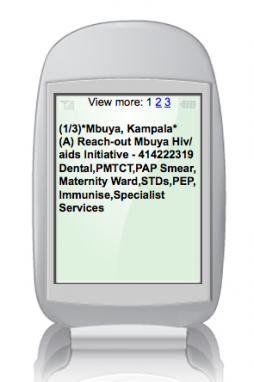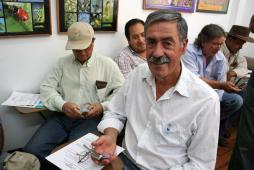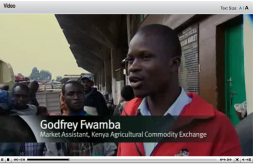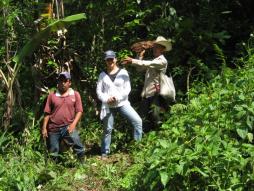agriculture
Posted by LeighJaschke on Jul 17, 2009
“Can You Hear Me Now?” How Cell Phones are Transforming Markets in Sub-Saharan Africa data sheet 2047 Views
Abstract:
Cell phones are quickly transforming markets
in low-income countries. The effect is particularly
dramatic in rural areas of sub-Saharan Africa, where
cell phones often represent the fi rst development in
telecommunications infrastructure. The twelve million
residents of Niger, a landlocked country in West
Africa, had 20,000 landlines—an estimated 2
landlines per 1,000 people—when mobile phones
were fi rst introduced in 2001. Now Niger has
almost 400,000 cell phone subscribers. Although
the country still has the lowest rate of cell phone
adoption in sub-Saharan Africa, cell phone coverage
has had important implications for grain markets and
hence welfare in the country.
Posted by KatrinVerclas on Jun 30, 2009
Google, in partnership with MTN Uganda, has launched 'Google SMS', a set of services that allows users in the country to access SMS information services. These include, for example, access to health and agriculture tips, weather information, and news and sports. Google offers these online information services aready on the web, but is now expanding them to SMS - however, at a high price per SMS.
"We seek to serve a broad base of people -- not only those who can afford to access the Internet from the convenience of their workplace or with a computer at home," said Rachel Payne, Google's country manager for Uganda, in a post on the Google blog.
Posted by CorinneRamey on Jun 16, 2009
At a small agrarian cooperative in Chile, farmers with little access to the internet have a new source of farming information: text messaging. The messages, a combination of national and international news and farming information about topics like weather and pricing, are part of a project called DatAgro, which aims to bring relevant farming information to rural populations that have little access to computers.
DatAgro is a collaboration between Washington, D.C.-based nonprofit DataDyne and the Santiago-based Zoltner Consulting Group, which looks at ways that ICTs can be used for development. The project is primarily funded by a $325,000 Knight News Challenge Grant and will continue until November 2010.
Posted by cmasiello on Apr 13, 2009
MobileActive members are invited to participate in the upcoming virtual forum on Mobile Telephony in Rural Areas (e-agriculture) 20-30 April 2009. The dicussions will be in Spanish.
Posted by cmasiello on Oct 29, 2008
Mobile phones bridge the rural digital divide, bring economic benefits, and act as agents of social mobilization through improved communication. But what are the real challenges of reaching rural areas, and what are some of today’s most beneficial applications that can help rural communities, specifically regarding agriculture development?
The Virtual Forum on "Mobile Telephony in Rural Areas" will examine the challenges that rural communities face in enhancing the benefits of mobile telephony, and look at some examples of interesting initiatives and good outcomes from around the globe.
Subject Matter experts include:
Posted by KatrinVerclas on Sep 09, 2008
Yael Schwartzmann is a social entrepreneur, a programmer, and a mobile innovator. She developed a mobile data collection application-- DigitalICS -- to monitor smallholder coffee farmers' compliance with organic, fair trade certifications and quality requirements at a rural coffee cooperative in Oaxaca, Mexico. Yael will feature DigitalICS (pronounced Digitalix) at MobileActive08's SIMPlace. In my interview with her, we discuss why mobile phones are so useful for agricultural data collection on compliance and certification, how the application works, where else it could be used, and why she is passionate about her work.
Here is the audio of my interview with Yael; an edited transcript follows.
Posted by Esther Nasikye on Aug 24, 2008
Agriculture is what keeps economies in most developing countries alive. However, farmers in many countries face major challenges. In an age of global markets, they are forced to enhance production, improve the quality of their yield, and access markets within short timeframes. Small-scale farmers especially have traditionally been deprived of weather and crop information, have been at the mercy of middlemen, and have lacked timely market price information to negotiate the best deal. This has chancged with the a connect people advent of widespread telephony that connects farmers wiith markets, weather, and other data.
Governments, non-governmental organisations (NGOs) and international donors are taking advantage of this technology revolution to help farmers access market information. They are convinced that low-cost access to agricultural prices could yield enormous payoffs.
In Uganda, the Women of Uganda Network (WOUGNET), a local NGO, is helping over 400 rural farmers in the Apac District in Northern Uganda, access information on market prices through text messages (SMS).






